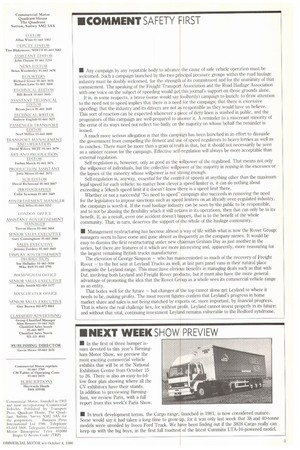• COMMENT SAFETY FIRST
Page 5

If you've noticed an error in this article please click here to report it so we can fix it.
/ Any campaign by any reputable body to advamx the cause of safe vehicle operation must be welcomed. Such a campaign launched by the two principal pressure groups within the road haulage industry must be doubly welcomed, for the strengtl of its commitment and for the unanimity of that commitment. The speaking of the Freight Transpo Association and the Road Haulage Association with one voice on the subject of speeding would get this journal's support on those grounds alone. It is, in some respects, a brave (some would say foolhardy) campaign to launch: to draw attention to the need not to speed implies that there is a nee d for the campaign; that there is excessive speeding; that the industry and its drivers are not as responsible as they would have us believe. This sort of reaction can be expected whenever a piece of dirty linen is washed in public, and the progenitors of this campaign are well-prepared to answer it. A reminder to a miscreant minority of the error of its ways need not reflect too badly on the majority on whose behalf the reminder is issued.
A much more serious allegation is that this camp the government from compelling the fitment and u to coaches. There must be more than a grain of trt as a sinister reason for the campaign. Effective sell external regulation.
Self-regulation is, however, only as good as the willpower of the regulated. That means not only the willpower of individuals, but the collective will wer of the majority in reining-in the excesses or ign has been launched in an effort to dissuade of speed regulators to heavy lorries as well as h in that, but it should not necessarily be seen regulation will always be more acceptable than the lapses of the minority whose willpower is not strong enough. Self-regulation is, anyway, essential for the cont ol of speeds at anything other than the maximum legal speed for each vehicle: no matter how clever a speed limiter is, it can do nothing about exceeding a 50knvh speed limit if it doesn't know there is a speed limit there.
Whether or not a successful "No need to speed''' campaign also succeeds in removing the need for the legislators to impose sanctions such as speed limiters on an already over-regulated industry, the campaign is worth it. If the road haulage industry can be seen by the public to be responsible, and to not be abusing the flexibility which it still retains in its operations, then that can only be to its benefit. If, as a result, even one accident doesn't happen, that is to the benefit of the whole community. That, in turn, deserves the support of the whole of the haulage community.
/ Management restructuring has become almost a way of life within what is now the Rover Group: managers seem to have come and gone almost as frequently as the company names. It would be easy to dismiss the first restructuring under new chairman Graham Day as just another in the series, but there are features of it which are more interesting and, apparently, more reassuring for the largest remaining British trucks manufacturer.
The elevation of George Simpson who has masterminded so much of the recovery of Freight Rover to the hot seat at Leyland Trucks as well, at last puts panel vans in their natural place alongside the Leyland range. This must have obvious benefits in managing deals such as that with Daf, involving both Leyland and Freight Rover products, but it must also have the more general advantage of promoting the idea that the Rover GrOup as a whole sees its commercial vehicle range as an entity.
That bodes well for the future but changes at the top cannot alone get Leyland to where it needs to be, making profits. The most recent figures confirm that Leyland's progress in home market share and sales is not being matched by exports or, more important, by financial progress. That is where the real challenge lies, for without profit, Leyland cannot invest properly in its future: . .. . . . . . . . . . . .. .„ . and without that vital, continuing investment Leyland remains vulnerable to the bedlam syndrome.








































































































































